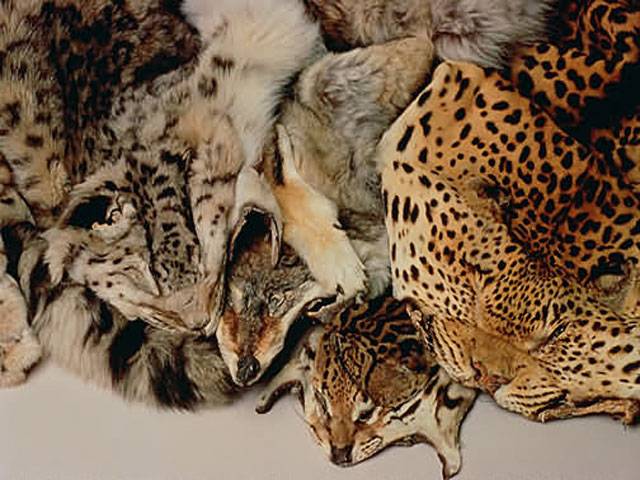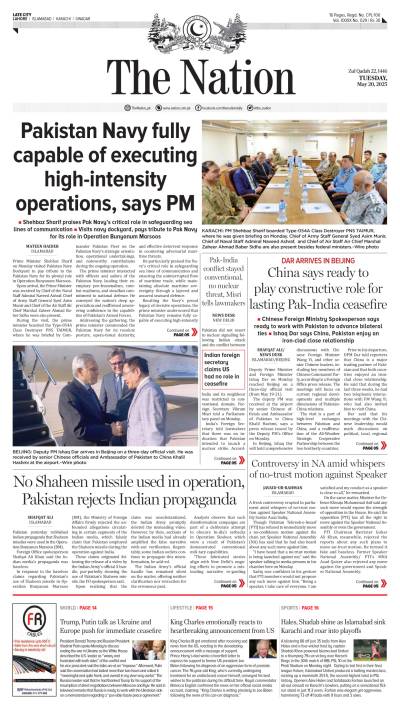LAHORE - Heads of state, ministers and representatives of 46 countries, including those most heavily impacted by poaching and illegal trade of wildlife, committed to taking “decisive and urgent action” to tackle the global illegal wildlife trade.
The declaration was issued following two days of closed-door negotiations hosted in London by the UK. Prince Charles, William and Harry also participated in the event. African countries whose elephant populations are under threat were present at the occasion. Other countries that represent major transit points for ivory shipped from Africa to Asia were also in attendance, including Togo, the Philippines and Malaysia, and significantly, China, the major market for illegal ivory.
WWF-Pakistan strongly supports the declaration as Pakistan faces many threats to wildlife species and illegal wildlife trade exists in this region as well. Illegal trade of shahtoosh and carcasses of endangered turtle species is a concern, whereas snow leopard and common leopard pelts are also reportedly traded.
Similarly, countries at the centre of the rhino horn trade chain were represented, including South Africa, Mozambique and Vietnam, as well as some of those impacted by the illegal trade in tiger parts: Indonesia, Myanmar, Russia and China.
Measures agreed by countries signing the declaration include action to eradicate the market from illegal wildlife products; agreement to strengthen law enforcement efforts and ensure that effective legal frameworks and deterrents are in place; and moves to promote sustainable livelihoods through positive engagement with local communities.
WWF and TRAFFIC welcome the post-conference “London Declaration” for recognising the significant scale and detrimental economic, social and environmental consequences of illegal wildlife trade, including how poaching and trafficking are increasingly controlled by organised criminal networks that undermine the rule of law and good governance and encourage corruption.
Heather Sohl, Chief Species Advisor at WWF-UK, said:“Governments signing the London Declaration today sent a strong message: Wildlife crime is a serious crime and it must be stopped. This trafficking devastates species populations, but also takes the lives of rangers, impedes countries’ economic development and destabilises society by driving corruption. This is a crisis, not just at a national or regional scale, but one that demands urgent global attention, and so warrants high-level political support through the appointment of a dedicated United Nations Special Representative.”
Meanwhile, World Wide Fund for Nature-Pakistan (WWF-Pakistan) organised a field visit for journalists to its ex-situ conservation project facility at Changa Manga where they were briefed about the Gyps Vulture Restoration Project and ongoing activities.
The Gyps vulture species; white - backed vulture (Gyps bengalensis) and long - billed vulture (Gyps indicus) have declined by more than 90% in Pakistan, India and Nepal since the early 1990s, and are now classified as Critically Endangered by IUCN (Bird Life International 2004).
Journalists from ‘The Nation’ surveyed part of the forest via tram and later were taken to the Gyps Vulture Restoration Facility where they observed the feeding of vultures and their behaviour in captivity. They were also briefed by Faisal Farid, Primary Vulture Supervisor, WWF-Pakistan who highlighted the ecological importance of vultures and the reason for their rapid decline. He noted that captive breeding is one of the key conservation measures to save the species along with the lobbying of a Diclofenac free environment.
Diclofenac Sodium, a non-steroidal anti-inflammatory drug (NSAID), used in livestock, is the main cause of mortality in the species that results in kidney failure in vultures. Vultures are ecologically important, being responsible for consuming dead animals and cleaning the environment.
In 2005, WWF-Pakistan launched a captive breeding programme at Changa Manga forest, 80km south west of Lahore, aiming to secure a viable population of the white-backed vulture (Gyps bengalensis), a regional priority species for the Global Programme Framework of the WWF Network. Currently there are 15 white-backed vultures in the facility at Changa Manga forest facility. One of the project’s biggest achievements has been lobbying with the government to successfully implement a ban on the sale and manufacture of Diclofenac Sodium in September 2006. The Gyps Vulture Restoration Facility is the only ex-situ project in Pakistan dedicated to fight the threats faced by white-backed vultures. Ex-situ conservation means protecting an endangered species outside its natural habitat where it exists. WWF–Pakistan is also a member of the Vulture Specialist Group of IUCN’s Species Survival Commission.
Tuesday, May 20, 2025
46 countries agree to tackle illegal wildlife trade

Caption: 46 countries agree to tackle illegal wildlife trade
Pakistan, China reaffirm health sector cooperation
May 20, 2025
Ministers’ absence disrupts PA session
May 20, 2025
-
Lahore emerges among safest global cities in Numbeo 2025 index
-
Lahore emerges among safest global cities in Numbeo 2025 index
-
India’s suspension of Indus Water Treaty legally baseless
-
Seventh polio case reported in Pakistan amid nationwide vaccination drive
-
Pakistan reports sixth polio case of 2025
-
PTA begins issuing VPN licences to regulate usage
The Wider War
May 20, 2025
Margalla on Fire
May 20, 2025
Defeated and Depressed
May 20, 2025
Regional Reset
May 19, 2025
Peak Potential
May 19, 2025
Worse than Anarchy
May 20, 2025
Salute to our Air Force
May 20, 2025
An Unbreakable Wall
May 20, 2025
Profiteering Milk
May 20, 2025
Rewriting the Rules
May 20, 2025
ePaper - Nawaiwaqt
Nawaiwaqt Group | Copyright © 2025





